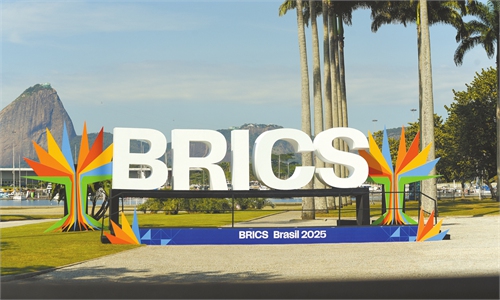The 17th BRICS Summit is being held from July 6 to 7 in Rio de Janeiro, Brazil. This marks the first high-profile gathering of the "greater BRICS family" in its new "11+10" format - comprising 11 member countries and 10 partner countries - following Indonesia's official entry into the BRICS cooperation mechanism in January and Vietnam's official joining as a BRICS partner country in June. The summit is themed "Strengthening Global South Cooperation for More Inclusive and Sustainable Governance." As the host country, Brazil has outlined three key priorities for the meeting: deepening cooperation in public health, promoting a unified stance on climate change, and establishing mechanisms to facilitate trade and investment among member states.
On the eve of the summit, Colombia and Uzbekistan formally joined the New Development Bank as full members. Today, the BRICS family represents over half of the world's population, accounts for one-fifth of global trade, and contributes nearly 30 percent of global GDP. This remarkable momentum is no accident - it reflects the growing appeal of the "BRICS spirit" of openness, inclusiveness, and win-win cooperation. According to data from the International Monetary Fund (IMF), in 2024, BRICS collectively reached 4 percent GDP growth, significantly outpacing the global average. This demonstrates that the "greater BRICS" has become a "southern engine" that continuously fuels global development.
According to some foreign media outlets, this year's summit will discuss important topics, including the establishment of a new guarantee fund and the "Tropical Forests Forever Facility," and will voice collective positions on IMF reform. As the world is entering a new period of turbulence and transformation, characterized by rising unilateralism and protectionism, and some major powers increasingly disengaging from international governance, BRICS remains steadfast in its original aspiration, focusing squarely on cooperation and development. All its agendas and agreements are being gradually implemented, turning words on paper into real development outcomes. As of 2024, the BRICS New Development Bank has approved 120 projects worth a total of $39 billion, covering key sectors such as transport infrastructure, clean energy, healthcare, and social development. As the "vanguard of the Global South," the "greater BRICS" governance proposals are receiving global attention, and the world is looking to the "greater BRICS" for wisdom and contributions.
The growing influence of the "Greater BRICS" is evident in Western reporting. From the very start, the Rio BRICS Summit has become a focal point of global attention. Reuters noted that the expansion of the "Greater BRICS" "has added diplomatic weight to the gathering" and the bloc is presented "as a defender of multilateralism in an increasingly fractured world." The New York Times focused on the new role of "BRICS" in global governance, emphasizing its ambition to "rebalance global power dynamics." Although some media outlets maintain a "critical" and "skeptical" attitude toward the BRICS Summit, the inherent "traffic appeal" of the Rio Summit is enough to reflect the international community's attention to and recognition of BRICS.
The BRICS countries differ in terms of historical culture, political systems, economic size, and development levels, and there are differences between overall interests and individual interests. However, this precisely reflects the valuable inclusiveness and complementarity of the BRICS mechanism. BRICS cooperation is a systematic collaboration of the Global South; it is both comprehensive cooperation and open-door cooperation. It embodies the voices of the Global South, providing more development opportunities and equal rights for countries in the Global South, and promoting an equal and orderly multipolar world as well as a universally beneficial and inclusive economic globalization. This not only aligns with the interests of the Global South but also contributes to the common good of the world.
From promoting the establishment of the New Development Bank to advocating for the "BRICS+" cooperation model; from articulating the "four major partnerships" among BRICS countries to building new industrial revolution partnerships within BRICS, China's contributions to the BRICS mechanism are evident. According to the "Hand in Hand: China-LAC Mutual Perception Survey," released by the Global Times Institute during the "Global Times' Overseas China Week and Global South Dialogue" series of events held in Latin America in late June, a majority of respondents from six Latin American countries believe that the BRICS can represent the Global South to voice its concerns on the international stage. Furthermore, 93 percent of Latin American respondents believe that China has brought opportunities for development to the region, and 84 percent recognize China's development prospects. Through its own actions, China has built a bridge of hope for common development, making the gears of "greater BRICS" cooperation operate more smoothly.
IIn the face of the ever-changing international landscape, BRICS countries have demonstrated strong cohesion and action, providing a "BRICS answer" to the changes unseen in a century, which enhances the credibility of BRICS. The Rio Summit will mark a new starting point. Looking ahead, BRICS countries will continue to uphold the "BRICS spirit," deepen cooperation in various fields, promote reforms in the global governance system, and make greater contributions to world peace and development.- Global Times
Related:
BRICS: not against anything, but for development, fairness and Global South
BRICS is not “against” anything; it is “for”: for the development, for a fairer world order, and a larger role for the Global South. It concentrates on specific development problems, which makes BRICS very attractive to other developing




No comments:
Post a Comment